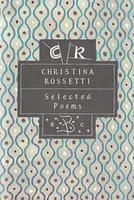Christina Rossetti's poetry (at least, as represented by those poems which are collected here) deals with the fairly familiar themes of death, love, nature, and faith. Early on in the book, I noticed several references to the vanity of life, as dwelt upon in the book of Ecclesiastes. Most of the poems are fairly short, and take up only one page or two (and these are not large pages), which makes them easier to take in and re-read. There are also a few longer poems, though, most notably "The Convent Threshold" and "Goblin Market". The last section of this book is a sonnet sequence based on the poetry of Dante and Petrarch, and is Rossetti's idea of what we might have if some the beloved and often unnamed ladies in poetry had been allowed to write poetry for themselves, rather than only appearing in the words of their lovers.
Some people say that you shouldn't read selected poetry, because you are at the mercy of the editor and their interpretation of the poet-- you can't see the whole picture. However, selected editions of poetry like this do have the benefit of being short enough that you can read them in a relatively brief time period, maybe in the space of a day or two, which seems like a good thing to me. I have lots of anthologies of poetry, huge collected works-- but they are too massive and intimidating to just pick up and read. And while I may not get the bigger picture of Rossetti's work, there is certainly much to enjoy here.
Rossetti lived from 1830-1894, and wrote during what we call the Victorian period, so her word choice and order might sound a little stilted or archaic to people who read only modern verse. But if you are able to get past that, there are some lovely poems and great ideas. Some of the poems about love are rather playful-- for instance, Rossetti's poetic version of the infamous "let's just be friends" line, where the final rhyme makes her refusal quite emphatic:
Here's friendship for you if you like; but love,--
No, thank you, John.
The longer poem "Goblin Market", which has quite a range of metrical variation, tells the story of two sisters, Lizzie and Laura, who are tempted by the forbidden fruits offered by Goblin sellers every evening. One of the sisters gives in and tastes the luscious fruit-- but afterwards, can no longer here the Goblin voices nad pines away for desire of the fruit. Finally her sister screws up her courage and goes to the Goblins to try to buy fruit for her dying sister-- the Goblins refuse, of course, but when they attempt to force the fruit down her throat, she lets them do so, and runs home with the streaming juices on her face to save her sister with her love. It may be intended as a morality tale about innocence and sisterly love, but the poem would be just as at home in a book of fairy stories.
Many of Rossetti's poems are pervaded by her religious convictions, which seems, unfortunately, to make her unpopular with the literati in this day & age. People seem inclined to think she was deluded, or not brave enough to think for herself and move beyond religious faith; there is plenty of tension and doubt even in her religious poetry, and the conflict between earthly love and faith is certainly clear in "The Convent Threshold." But Rossetti herself wrote that she didn't mind being forgotten, in the concluding lines of the beautiful poem "Remember."
Yet if you should forget me for a while
And afterwards remember, do not grieve:
For if the darkness and corruption leave
A vestige of the thoughts that once I had,
Better by far you should forget and smile
Than that you should remember and be sad.
| Title: | Selected Poems |
|---|---|
| Author: | Christina Rossetti |
| Date published: | 1992 (Bloomsbury edition) |
| Genre: | Poetry |
| Number of pages: | 127 |
| Notes: | Purchased in London. This is a repeat reading. |



0 comments:
Post a Comment